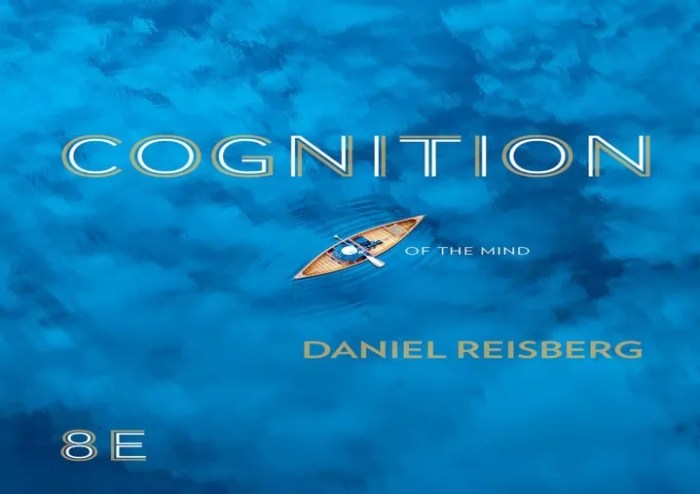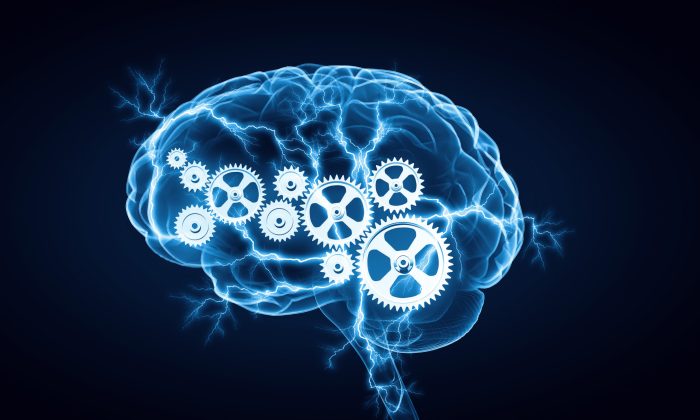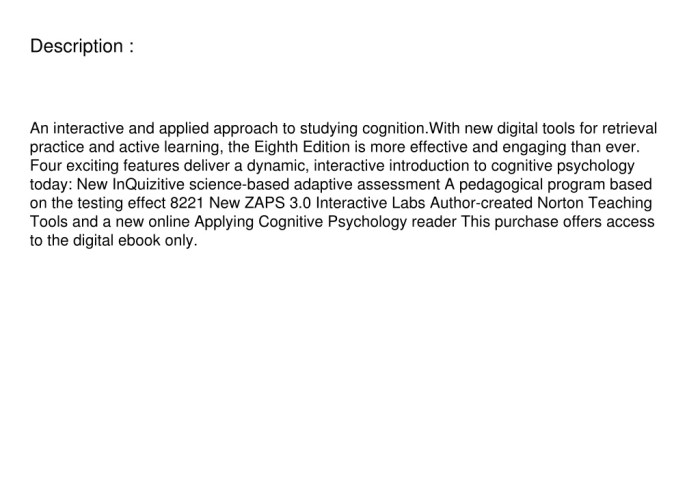Cognition exploring the science of the mind eighth edition – Cognition Exploring the Science of the Mind, Eighth Edition, embarks on an enthralling exploration of the intricacies of the human mind, providing a comprehensive understanding of its processes, neurobiology, development, disorders, and applications.
This seminal work delves into the fundamental concepts of attention, memory, and language, illuminating their profound impact on cognitive function. It unveils the intricate workings of the brain, unraveling the mysteries of neural networks and neurotransmitters that underpin our cognitive abilities.
Cognitive Processes

Cognitive processes refer to the mental operations that allow us to acquire, store, retrieve, and use information. They encompass a wide range of abilities, including attention, memory, language, and thought.
Attention
Attention is the ability to focus our cognitive resources on specific stimuli or tasks. It involves filtering out irrelevant information and directing our mental energy towards the most important aspects of our environment. Attention plays a crucial role in cognition by allowing us to process information efficiently and respond appropriately to our surroundings.
Memory
Memory refers to the ability to store and retrieve information over time. There are different types of memory, each serving a specific function. Short-term memory, also known as working memory, holds information for a few seconds or minutes, while long-term memory stores information indefinitely.
Memory is essential for learning, problem-solving, and decision-making.
Language and Thought
Language and thought are closely intertwined and influence each other in complex ways. Language provides us with a system of symbols and rules that allow us to communicate our thoughts and ideas. Thought, on the other hand, involves the manipulation of mental representations, such as concepts, images, and propositions.
Language and thought work together to enable us to reason, solve problems, and create new knowledge.
Neurobiology of Cognition
The neurobiology of cognition explores the relationship between the brain and cognitive processes. It seeks to understand how the brain’s structure and function support our ability to think, learn, and remember.
Brain Regions Involved in Cognition
Specific brain regions play crucial roles in different cognitive processes. The prefrontal cortex, for example, is involved in executive functions such as planning, decision-making, and working memory. The hippocampus is essential for memory formation and retrieval, while the temporal lobes are involved in language processing.
Neural Networks
Neural networks are interconnected groups of neurons that process information and support cognitive abilities. When we learn or remember something, changes occur in the strength and connectivity of neural networks, resulting in the formation of new neural pathways.
Neurotransmitters, Cognition exploring the science of the mind eighth edition
Neurotransmitters are chemical messengers that facilitate communication between neurons. They play a critical role in cognitive processes, such as memory, attention, and mood. Dopamine, for instance, is involved in reward and motivation, while serotonin is associated with mood regulation.
Cognitive Development

Cognitive development refers to the changes that occur in cognitive abilities throughout the lifespan. It is a gradual process that begins in infancy and continues into adulthood.
Stages of Cognitive Development
Jean Piaget proposed a theory of cognitive development that divides it into four stages: sensorimotor, preoperational, concrete operational, and formal operational. Each stage is characterized by specific cognitive abilities and ways of thinking.
Role of Experience and Environment
Experience and environment play a significant role in cognitive development. Children who grow up in stimulating environments with access to education and opportunities for exploration tend to have higher cognitive abilities than those who do not.
Cultural Factors
Cultural factors can also influence cognitive development. Different cultures emphasize different values and ways of thinking, which can shape children’s cognitive development in unique ways.
Cognitive Disorders: Cognition Exploring The Science Of The Mind Eighth Edition

Cognitive disorders are conditions that affect cognitive abilities, such as memory, attention, and reasoning. They can be caused by a variety of factors, including aging, disease, and injury.
Common Cognitive Disorders
Common cognitive disorders include Alzheimer’s disease, dementia, and traumatic brain injury. Alzheimer’s disease is a progressive neurodegenerative disorder that affects memory, thinking, and behavior. Dementia is a general term for a decline in cognitive abilities severe enough to interfere with daily functioning.
Traumatic brain injury can result in a range of cognitive impairments, depending on the severity of the injury.
Impact on Daily Functioning
Cognitive disorders can have a significant impact on daily functioning. They can make it difficult to perform everyday tasks, such as cooking, driving, and managing finances. They can also affect social interactions and relationships.
Treatments and Interventions
There is no cure for most cognitive disorders, but there are treatments and interventions that can help manage symptoms and improve quality of life. These include medications, cognitive rehabilitation, and lifestyle changes.
Applications of Cognitive Science

Cognitive science has a wide range of applications in fields such as education, healthcare, and artificial intelligence.
Education
Cognitive science can help us understand how people learn and how to create more effective educational programs. For example, research on attention and memory can inform the design of instructional materials and teaching methods.
Healthcare
Cognitive science can be used to develop new diagnostic tools and treatments for cognitive disorders. For example, neuroimaging techniques can help diagnose Alzheimer’s disease, and cognitive rehabilitation can help improve memory and other cognitive abilities.
Artificial Intelligence
Cognitive science provides the foundation for artificial intelligence (AI) systems that can perform cognitive tasks, such as natural language processing, image recognition, and decision-making. These AI systems are used in a variety of applications, including self-driving cars, medical diagnosis, and customer service.
Clarifying Questions
What are the key cognitive processes?
Attention, memory, and language are fundamental cognitive processes that shape our perception, learning, and communication.
How does the brain support cognition?
Neural networks and neurotransmitters within specific brain regions facilitate information processing, memory formation, and cognitive abilities.
What factors influence cognitive development?
Cognitive development is shaped by a complex interplay of experience, environment, and cultural influences.
What are common cognitive disorders?
Alzheimer’s disease and dementia are prevalent cognitive disorders that impair memory, thinking, and daily functioning.
How is cognitive science applied in real-world settings?
Cognitive science finds applications in education, healthcare, and artificial intelligence, offering insights into learning, diagnosis, and human-computer interaction.